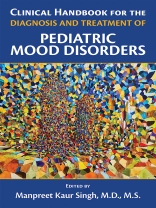Mental health clinicians have become increasingly aware that mood disorders often first manifest in childhood and adolescence. As the only reference for mental health professionals and trainees on the topic, Clinical Handbook for the Diagnosis and Treatment of Pediatric Mood Disorders fills a critical gap in the literature and addresses a critical need for the growing number of affected youth. The editor has recruited a roster of first-class contributors, and together, they have created an up-to-date resource that captures the rapid and dramatic advances in the field, offers practical solutions to common diagnostic and treatment challenges, and provides an evidence-based framework that encourages easy integration into practice. Designed to reach a broad audience of learners by providing authoritative and accessible information that is relevant and applicable to real-world clinical practice, the handbook also aims to be a useful compendium to clinicians in training, who can refer to it for expert consultation or augment their learning in clinical and academic settings.
Useful features abound: The chapter-opening cases engage the reader and create a down-to-earth, clinical framework for understanding the chapter’s content. Readers will also find ‘clinical pearls’ at the end of each chapter that distill the information presented and constitute an easy-to-use summary. To further optimize learning, the book employs numerous graphical formats to illustrate, explain, and summarize chapter content, and supplements key content areas with an appendix of resources for those interested in expanding their knowledge. The book was designed to appeal to learners along a wide continuum, and for trainees and practitioners in all stages of their careers — from the novice seeking a jump start in working with youth populations to the experienced clinician interested in brushing up on the most state-of-the-art evidence. In addition, the book will be of great interest to professionals from multiple disciplines, including general and subspecialty psychiatrists, nurses, social workers, psychologists, pediatricians, and other primary care specialties and allied health professionals. The content is available in multiple formats, published with the latest information-sharing platforms in mind to ensure that readers can enjoy both in print and e-versions.
Comprehensive, yet concise enough to be readily usable, Clinical Handbook for the Diagnosis and Treatment of Pediatric Mood Disorders provides professionals with the practical information needed to balance benefits, risks, and alternatives to state-of-the-art treatment approaches.
قائمة المحتويات
Preface Foreword Part 1: Diagnosis Chapter 1. Principles of Assessment of Mood Disorders in Childhood Chapter 2. DSM-5 Diagnosis of Mood Disorders in Children and Adolescents Chapter 3. Addressing Clinical Diagnostic Challenges in Pediatric Mood Disorders Chapter 4. Principles of Treatment of Mood Disorders Across Development Chapter 5. Neuroscience of Early-Onset Depression Chapter 6. Neuroscience of Childhood-Onset Bipolar Disorder Part 2: Treatment Chapter 7. Evidence-Based Psychotherapies for Pediatric Major Depressive Disorders Chapter 8. Evidence-Based Psychotherapies for Pediatric Bipolar Disorders Chapter 9. Pharmacotherapy for Pediatric Depression Chapter 10. Pharmacotherapy for Pediatric Bipolar Disorders Chapter 11. Longer-Term Management of Mood Disorders in Youth Chapter 12. Assessment, Prognosis, and Treatment of Subthreshold Mood Symptoms Chapter 13. Management of Suicidal Youth Chapter 14. Management of Common Co-occurring Conditions in Pediatric Mood Disorders Chapter 15. Educational Interventions for Childhood-Onset Mood Disorders Chapter 16. Preventative and Emerging Pharmacological and Nonpharmacological Treatments Part 3: Appendixes A. Quick Reference Resources and Readings B. Quick Reference Facts for the Treatment of Pediatric Mood Disorders Index
عن المؤلف
Manpreet Kaur Singh, M.D., M.S., is Associate Professor of Psychiatry and Behavioral Sciences; Director of the Stanford Pediatric Mood Disorders Program; and the Akiko Yamazaki and Jerry Yang Faculty Scholar in Pediatric Translational Medicine at Stanford’s Maternal Child Health Research Institute at Stanford University in Stanford, California.�












